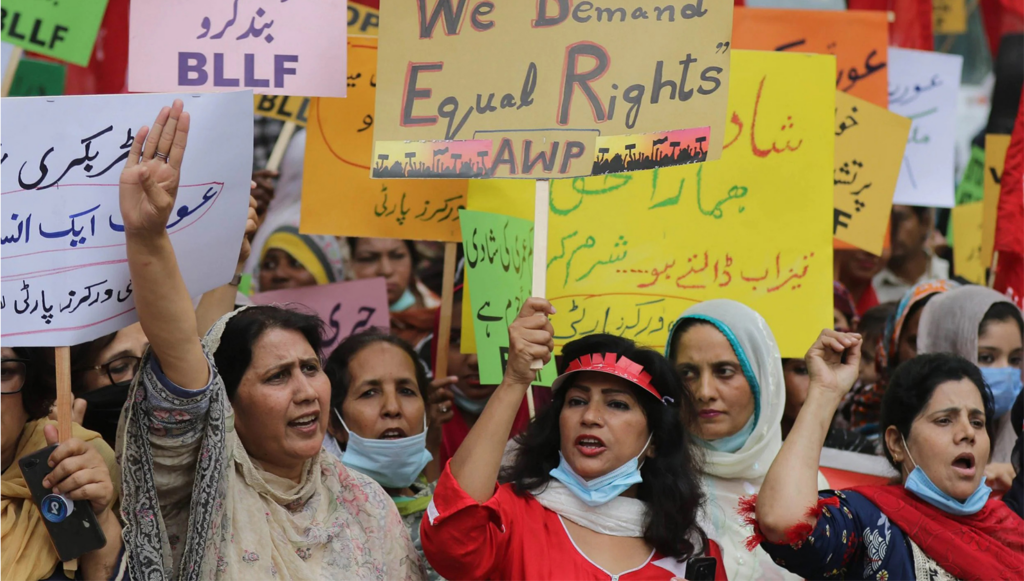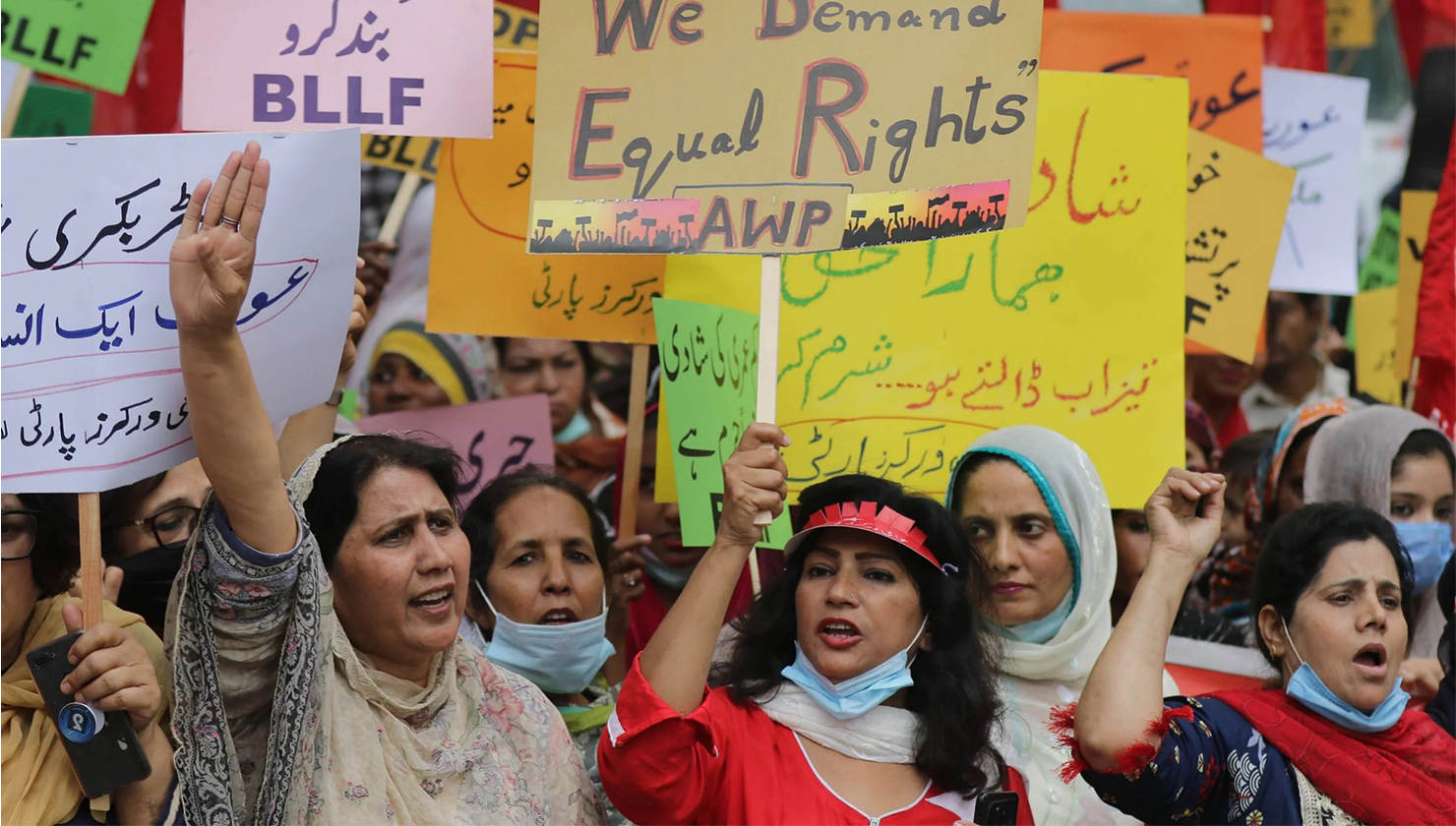
77 Years Later: Women, Religion, and Gender Biases in Pakistan
Pakistan\’s commemoration of its 76th year of independence ironically highlights the dire situation of its women to the world. Even after seven long decades post-independence, women in Pakistan are still deprived of basic rights like education, freedom of expression, and opportunities for employment. Interactions with these women reveal a bleak landscape of their relentless battles and diminishing hopes, questioning the essence of what independence and empowerment should signify in contemporary Pakistan.

The Global Gender Gap Index Report 2022 starkly showcases Pakistan\’s lamentable gender disparities. Globally, Pakistan regrettably ranks near the bottom in areas such as economic participation, education, health, and survival. These glaring figures bring to light the deep-seated gender biases corroding Pakistani society. Heartbreakingly, interviews depict that many women, from diverse backgrounds, feel oppressed and frequently persecuted. The glaring lack of women in political leadership roles further accentuates the overpowering grasp of patriarchal norms.
As Pakistan grapples with increasing vulnerabilities to climate change, it is the women who suffer most. The evident link between environmental concerns and gender inequities is undeniable, more so when environmental calamities intensify the hardships for women. Disappointingly, Pakistan\’s leadership and related agencies seem to disregard the urgent need for gender-sensitive climate policies. Women are forced to grapple with the adverse effects of polluted air, dwindling water resources, and other ecological hazards.
Karachi, often hailed as the crown jewel of Pakistan, sadly reflects the country\’s deep-seated gender prejudice. Interviews conducted there consistently highlight the harrowing challenges women face daily in their pursuit of fundamental rights. The pervasive issue of harassment looms over many working women, indicating a stark absence of safety and respect in society. Their stories resonate with the perpetual tension between aspiring for basic liberties and the grim reality of a society that denies them. While there are sporadic glimpses of progress in isolated pockets of Pakistan, they are largely eclipsed by overwhelming challenges. Although a section of women is experiencing improved access to education and a shift in societal attitudes, such changes only underline the inconsistent strides Pakistan is making towards gender equality. The societal chasm and economic divides paint a grim narrative: a handful of the educated find better opportunities abroad, while many remain entrapped in their homeland. Regions like Khyber Pakhtunkhwa serve as stark reminders of areas where opportunities for women\’s education and employment are scarcely available.
For a select few, empowerment is perceived as a state of mind. Yet, such an uplifting perspective is frequently overshadowed by societal constraints. While acknowledging one\’s self-worth can be liberating, the overwhelming societal barriers often appear insurmountable.
A disheartening reality permeating Pakistani society is that even though education is regarded as a catalyst for change, women\’s aspirations are recurrently thwarted. While both genders emphasise the significance of education, it\’s clear that education in isolation cannot reform the prevailing norms. A comprehensive transformation is essential. Families, communities, and policymakers must move beyond mere words and take decisive actions to ensure women are accorded their rightful stature in society.
Tragically, when evaluating Pakistan\’s intricate web of gender inequality, the plights of religious minority women further exacerbate the situation. Hindu, Sikh, and Christian women, already marginalised due to their gender, are subjected to heightened persecution based on their religious affiliations. Reports and personal accounts underscore distressing instances of kidnappings, forced religious conversions, and coerced marriages. These young girls are often brutally separated from their families and pressured into renouncing their faith, further alienating them within their communities. Such heinous acts are not just a violation of religious freedom and human rights but also emphasise Pakistan\’s pressing need to address the dual challenges of gender and religious persecution. The commitment to ensuring every woman\’s safety and freedom, regardless of her religious beliefs, must be unwavering. Amid these narratives of despair, the question that emerges is – where does Pakistan envision its future in terms of gender justice and religious freedom? With the rest of the world progressing towards more inclusive societies, Pakistan seems to be caught in a time warp, clinging to outdated norms and practices.
Yet, it is essential to remember that the situation isn\’t bereft of hope entirely. Grassroots movements, led by resilient Pakistani women and their allies, are sprouting across the country. These women, armed with education, determination, and a vision of a brighter future, are challenging the deeply entrenched norms. They are building networks, using both traditional methods and technology, to reach out, educate, and uplift their peers.
Furthermore, international attention and pressure could play a pivotal role. Global agencies, human rights organisations, and foreign governments can leverage their influence to urge the Pakistani administration to enforce stronger laws that protect the rights of all its citizens, irrespective of gender or religion. Sanctions, trade agreements, and international treaties can all serve as tools to nudge the nation towards the path of genuine reform.
On the cultural front, artists, writers, and filmmakers within Pakistan are pushing boundaries, creating works that challenge societal norms and provide a platform for the oppressed voices to be heard. The role of art and media as a force for change cannot be underestimated, especially in a digital age where content can transcend borders and inspire solidarity and action globally.
Pakistan stands at a crucial juncture. The choices it makes in the upcoming years will determine whether it continues its descent into a quagmire of regressive practices or rises, phoenix-like, to create a society that is just, inclusive, and forward-thinking. As the world watches, it remains to be seen if Pakistan will heed the cries of its women, recognise the strength in their resilience, and move towards a brighter, more equitable future.

